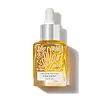What's inside
What's inside
 Key Ingredients
Key Ingredients

 Benefits
Benefits

 Concerns
Concerns

 Ingredients Side-by-side
Ingredients Side-by-side

Simmondsia Chinensis Seed Oil
EmollientPrunus Amygdalus Dulcis Oil
Skin ConditioningPrunus Armeniaca Kernel Oil
MaskingRosa Canina Fruit Oil
EmollientMoringa Oleifera Seed Oil
EmollientSimmondsia Chinensis Seed Oil, Prunus Amygdalus Dulcis Oil, Prunus Armeniaca Kernel Oil, Rosa Canina Fruit Oil, Moringa Oleifera Seed Oil, Daucus Carota Sativa Seed Oil, Tocopherol, Oryza Sativa Bran Extract, Rosmarinus Officinalis Leaf Extract, Helianthus Annuus Flower Extract, Cymbopogon Flexuosus Oil
Vitis Vinifera Seed Oil
EmollientSimmondsia Chinensis Seed Oil
EmollientCamellia Oleifera Leaf Extract
AstringentOenothera Biennis Oil
EmollientOlea Europaea Fruit Oil
MaskingArgania Spinosa Kernel Oil
EmollientRosa Canina Fruit Oil
EmollientSclerocarya Birrea Seed Oil
HumectantBoswellia Carterii Oil
MaskingCamellia Sinensis Callus
AntimicrobialDaucus Carota Sativa Seed Oil
EmollientMoringa Oleifera Seed Oil
EmollientCalophyllum Inophyllum Seed Oil
AntimicrobialAdansonia Digitata Oil
EmollientCitrus Aurantium Bergamia Fruit Oil
MaskingVitis Vinifera Seed Oil, Simmondsia Chinensis Seed Oil, Camellia Oleifera Leaf Extract, Oenothera Biennis Oil, Olea Europaea Fruit Oil, Argania Spinosa Kernel Oil, Rosa Canina Fruit Oil, Sclerocarya Birrea Seed Oil, Boswellia Carterii Oil, Camellia Sinensis Callus, Daucus Carota Sativa Seed Oil, Moringa Oleifera Seed Oil, Calophyllum Inophyllum Seed Oil, Adansonia Digitata Oil, Citrus Aurantium Bergamia Fruit Oil
Ingredients Explained
These ingredients are found in both products.
Ingredients higher up in an ingredient list are typically present in a larger amount.
Daucus Carota Sativa Seed Oil is the oil obtained from the seed of the edible carrot. The oil is created by steaming and distilling the seeds of the plant.
Carrot Seed Oil has hydrating, anti-inflammatory, and antioxidant properties.
As an emollient, carrot seed oil creates a thin film on the skin. This film prevents moisture from escaping, keeping your skin hydrated. Carrot seed oil has a soothing effect and can help alleviate inflammation.
As an antioxidant, carrot seed oil may help reduce the signs of aging. Antioxidants are able to neutralize free-radical molecules, or molecules that can damage our skin's cells and DNA.
Emerging studies show the alpha-pinene and carotol content give carrots antibacterial and antifungal properties. However, this is dependent on the amount of each compound. More studies are needed.
Carrot Seed Oil is not carrot oil. Carrot oil is created by mixing parts of the carrot in a carrier oil, such as coconut oil.
Learn more about Daucus Carota Sativa Seed OilMoringa Oleifera Seed Oil is the oil expressed from the seeds of Moringa oleifera plant. It is more commonly known as Moringa seed oil.
Moringa seeds have antioxidant, anti-inflammatory, and skin hydrating properties. These seeds are rich in oils, proteins, monounsaturated fats, and tocopherols.
As an emollient, moringa seed oil helps trap moisture in the skin by creating a film on top. This helps keep your skin hydrated and soft.
Many compounds in moringa seed oil are antioxidant and anti-inflammatory. These compounds include Vitamin E. , catechins, ferulic acid, and more.
Another compound found in Moringa seed oil is oleic acid.
Moringa trees are native to the Himalayan mountains.
This ingredient may not be fungal-acne safe.
Learn more about Moringa Oleifera Seed OilRosehip Oil is a non-fragrant plant oil. Rosehips are a fruit from a rose bush and are edible. This oil has skin conditioning and hydrating properties.
Rosehip contains Vitamin C, Vitamin E, fatty acids and linolenic acids. These nourish your skin barrier. Having hydrated skin may help reduce the appearance of fine-lines and wrinkles.
Another great component of Rosehip Oil is Vitamin A, or retinol. Vitamin A encourages your skin to create more collagen.
Rosehip oil may help with reducing pigmentation. The lycopene and beta-carotene have skin-lightening properties. However, more studies are needed to confirm this.
Learn more about Rosa Canina Fruit OilThis oil comes from the seeds of the desert shrub called Jojoba. It is more commonly known as jojoba oil, a non-comedogenic oil.
Jojoba oil does not contain fragrance and has many fatty-acids, making it a great soothing ingredient.
It also contains Vitamin E, a great moisturizing ingredient. Vitamin E is also an antioxidant and protects your skin against oxidative damage.
This ingredient humectant properties, meaning it helps draw moisture from the air. This helps keep your skin hydrated.
While jojoba has antibacterial properties, it is only able to kill some strains of bacteria.
Studies also show it helps in wound healing. In fact, Indigenous cultures have used jojoba as a moisturizer and to help treat burns for centuries.
Fun fact: Jojoba oil similar to natural human skin sebum, so it has a great effect on dry skin. It is also promising with helping to regulate sebum production.
Due to its fatty acid content, Jojoba oil may not be fungal acne safe. We recommend speaking with a professional if you have any concerns.
Learn more about Simmondsia Chinensis Seed Oil